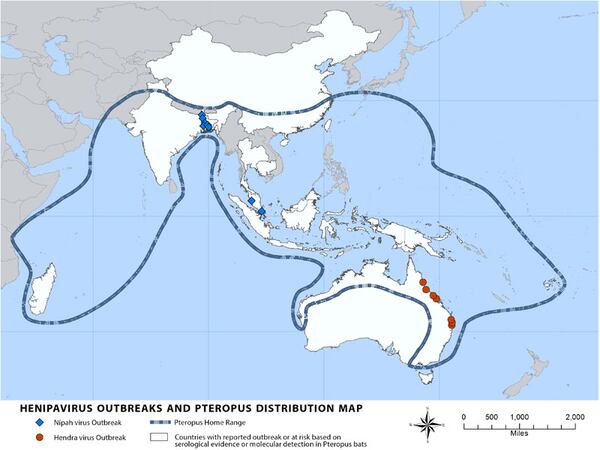This story has been updated.
At least 17 people have died of Nipah virus in the Indian state of Kerala since the rare outbreak began weeks ago, according to a Health Ministry official.
Several others with Nipah symptoms are being treated in area hospitals.
India's National Centre for Disease Control estimated that the current outbreak began when locals drew water from a bat-infested well, the New York Times reported on Monday.
If the outbreak spreads, experts believe the virus will first appear in Dubai.
» RELATED: Deadly Nipah virus has not spread in south India, officials say
Here’s what you need to know about the virus:
What is Nipah virus?
According to the Atlanta-based Centers for Disease Control and Prevention, Nipah virus was first isolated and identified in 1998-99 when Malaysian and Singaporean pig farmers and others in close contact with the animals suffered with encephalitis (inflammation of the brain) and respiratory illnesses.
The virus, a member of the family Paramyxoviridae, is named after the Malaysian village of Sungai Nipah, where many pig farmers became ill.
In 1999, nearly 300 human cases of Nipah virus were reported, including 100 deaths. More than one million pigs were euthanized to contain the outbreak.
» RELATED: Man in India dies while trying to take selfie with bear
The virus is more frequent in Bangladesh and India, where exposure to Nipah virus has been associated with eating raw date palm sap and with contact with infected bats or humans.
Nipah was first identified in Bangladesh in 2001. Annual outbreaks have occurred there and in eastern India since.
How is Nipah virus transmitted?
The virus is typically transmitted to humans after direct contact with bodily fluids of infected bats (commonly fruit bats of the Pteropodidae family), pigs or other infected people.
As aforementioned, consumption of raw date palm sap has also been associated with exposure to the virus. Fruit bats often eat dates from palm trees and sometimes nest in wells.
"Hospital-acquired infections are a major path of human to human transmission," the Indian microbiologist G. Arun Kumar testing the virus samples in India, told Reuters.
» RELATED: This virus looks and acts like the flu, but it isn't — What is adenovirus?
Symptoms of Nipah virus
- fever
- headache
- drowsiness
- disorientation
- mental confusion
- respiratory illness
According to the CDC, symptoms typically begin with fever and headache 5-14 days after exposure.
» RELATED: Scientists worry brain-wasting 'zombie deer' disease could spread to humans
Treatment of Nipah virus
There is no vaccine for Nipah, and no treatment beyond supportive care.
"The drug ribavirin has been shown to be effective against the viruses in vitro, but human investigations to date have been inconclusive and the clinical usefulness of ribavirin remains uncertain," the CDC reports.
The virus kills up to 75 percent of those infected.
Learn more about Nipah virus at CDC.gov.
The Associated Press contributed to this story.
About the Author


